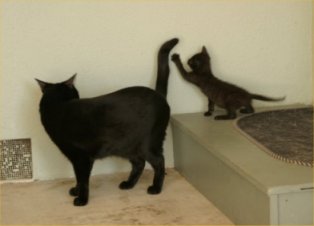 When I was young, I grew up on a ranch in Wyoming. My family were well-to-do, so the ranch was a retirement home. My father didn’t do any physical work unless it was for pleasure, which it often was. We ran a few cattle, and we had riding horses and two teams of workhorses. No one out our way had electric lights or telephones until we moved in and had the wires extended from town. (The telephone line was communal, so we all took turns on using it. If it was busy, you just waited. Our telephone number was 28.)
When I was young, I grew up on a ranch in Wyoming. My family were well-to-do, so the ranch was a retirement home. My father didn’t do any physical work unless it was for pleasure, which it often was. We ran a few cattle, and we had riding horses and two teams of workhorses. No one out our way had electric lights or telephones until we moved in and had the wires extended from town. (The telephone line was communal, so we all took turns on using it. If it was busy, you just waited. Our telephone number was 28.)
One day we children were whisked into town for the day, but I know what went on. A large hole was dug down closer to the barn, and the four workhorses were led into it. Then, one-by-one, they were shot. My father was a kindly man, but I do not recall why he had that done. All I can remember is that, after that, we had tractors—and no work horses. One of our saddle horses died of sleeping sickness (possibly near that time), and it may have been that the other horses were also coming down with it. I just don’t know.
It has always been my belief that most ranch hands have felt love for the animals they worked with. Red, our ranch hand, had no family that I was aware of, and no car to get there. This was 70-some years ago. Not everyone had cars, many hitch-hiked, and there was little to do in town except drink and look up the “girls.” He probably hitched a ride into town with Elmer, the foreman.
Thinking about that time from the viewpoint of the ranchers, having no car, and nothing much to do when you got there must have been a pretty lonely life for a ranch hand, especially if he was the only one on a ranch and uneducated to boot.
But this is not just about one family, one ranch, and four horses. It is about the beginnings of a time when so many ranchers and/or farmers were making changes, abandoning live animals for machinery. It is about a large part of human life when too many people (in town as well as country) began to turn from a life of depending on animals as well as returning their love to using things made of metal and glass in their stead.
By the same token, people began to turn from country living to living in cities packed close to each other. The odd thing is that, in a world long past, people could live far apart, yet count on each other at harvesting time, as well as when emergencies arose. And you always waved at everyone you passed, whether you knew them or not.
On the other hand, if you move into a large town or city, the tendency is to ignore most everyone, even your neighbors (sometimes even those in trouble.)
Here I am at the end of my blog, and where do I find myself without even realizing it? Pointing out a major part of what happens to humans as our numbers increase.
ARW
1/6/10
The Monster Our Society Created
-
Whoever ends up writing the history of this period of time in the American
experiment is going to have a difficult time making sense of the decisions
...
6 months ago





1 comments:
Little Bill I love your memories. I know you were in Wyoming but was it near Cheyenne? Did you go to Frontier days? You have me wondering about shooting the horses, was the depression already going?